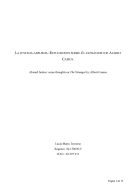Please use this identifier to cite or link to this item:
https://repositorio.uca.edu.ar/handle/123456789/2715| Título: | La justicia absurda : reflexiones sobre El extranjero de Albert Camus Absurd justice : some thoughts on The Stranger by Albert Camus |
Autor: | Traverso, Lucía María | Palabras clave: | Camus, Albert, 1913-1960; FILOSOFIA DEL DERECHO; JUSTICIA; EXISTENCIALISMO | Fecha de publicación: | 2018 | Cita: | Traverso, L. M. (2018). La justicia absurda : reflexiones sobre El extranjero de Albert Camus [en línea] Documento inédito. Universidad Católica Argentina. Facultad de Derecho. Disponible en: https://repositorio.uca.edu.ar/handle/123456789/2715 | Resumen: | Resumen: En el presente trabajo se realiza un análisis acerca de la concepción de justicia para el escritor y filósofo existencialista Albert Camus, especialmente partiendo de la obra El extranjero. La pregunta esencial versa sobre la existencia misma de la justicia en un mundo sin sentido, absurdo. ¿Qué posibilidades de justicia tenemos en un mundo sin Dios? ¿de dónde se deriva esta?. Para Meursault, el personaje principal, sólo la moralidad de otros es la que determina lo justo. Sólo los hombres -aunque pareciera que todos los hombres menos él- construyen lo bueno y lo malo. ¿Podemos tener principios morales sin Dios? ¿Puede este ateo, extranjero en su propio país, depender de las creencias de otros para poder diferenciar el bien del mal? Meursault comprende que solo el odio de los otros, su particular infierno, puede ser identificado con -lo que ellos llaman- justicia. ¿Puede ser, entonces, que así como Sartre afirmaba “el infierno son los otros”, para Meursault “la justicia sean los otros”? Abstract: In the present article an analysis is made about the conception of justice for the existentialist writer and philosopher Albert Camus, especially starting from the work The Stranger. The main question is about the very existence of justice in a meaningless, absurd world. What possibilities of justice do we have in a world without God? Where does it come from? For Meursault, the main character, only the morality of others is what determines what is right. Only men -though it seems that all men except for him- build the good and the bad. Can we have moral principles without God? Can this atheist, a foreigner in his own country, depend on the beliefs of others to differentiate good from evil? Meursault understands that only the hatred of others, his particular hell, can be identified with - what they call- justice. Can it be, then, that just as Sartre affirmed "hell is other people", for Meursault "justice is other people"? |
URI: | https://repositorio.uca.edu.ar/handle/123456789/2715 | Disciplina: | DERECHO | Derechos: | Acceso Abierto | Fuente: | Documento inédito, 2018 |
| Appears in Collections: | Documentos de Trabajo |
Files in This Item:
| File | Description | Size | Format | |
|---|---|---|---|---|
| justicia-absurda-reflexiones-traverso.pdf | 399,24 kB | Adobe PDF |  View/Open |
Page view(s)
4,735
checked on Apr 30, 2024
Download(s)
2,290
checked on Apr 30, 2024
Google ScholarTM
Check
This item is licensed under a Creative Commons License

